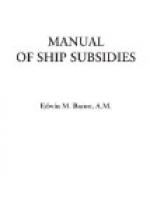In the Senate the bill fared well as a whole. Like the original bill it came back from the committee on commerce amended, though slightly, and with a minority report against it: the minority again emphasizing their “unqualified opposition to this renewed effort to donate to certain favored interests moneys collected by the Government for public purposes under its power of taxation."[IA] It was closely fought by the opposition in debate, opened with Senator Gallinger’s argument in its behalf on January 8, 1906. But it successfully ran the gauntlet. Further amended in several particulars, but unscathed in its essential parts, it passed the Senate, February 14, by a vote of 38 to 27, five Republican Senators and all the Democrats voting in the negative.[IB]
In the House its progress was less prosperous. It lay with the committee on merchant marine and fisheries into the second session of this Congress; and more hearings were given. Reframed after the enacting clause, but practically the same in principle, it was reported back January 19 (1907) by Mr. Grosvenor, accompanied by an explanatory report of the majority of the committee;[IC] and bill and report were referred to the whole House on the state of the Union. Later the views of the minority were filed.[IC] On January 23 a message from President Roosevelt in behalf of the measure was received. The president particularly urged the “great desirability of enacting legislation to help American shipping and American trade by encouraging the building and running of lines of large and swift steamers to South America and the Orient.” As striking evidence of the “urgent need of our country’s making an effort to do something like its share of its own carrying trade on the ocean,” he directed attention to the address of Secretary Root before the Trans-Mississippi Commercial Congress at Kansas City, Mo., the previous November, giving the results of the secretary’s experiences on his recent South American tour. The proposed law, Mr. Roosevelt repeated, was in no sense experimental. It was “based on the best and most successful precedents, as for instance on the recent Cunard contract with the British Government.” So far as South America was concerned, its aim was to “provide from the Atlantic and Pacific coasts better American lines to the great ports of South America than the present European lines.” Under it “our trade friendship” would “be made evident to the South American Republics."[ID]
Backed by the explanatory report and this message, the friends of the measure opened the debate, February 25, Mr. Grosvenor leading. It was a great debate, long and hot. Numerous amendments were put in; some changing the proposed routes, others adding new ones. At length on March 1, three days before the end of this Congress, the much amended bill was passed, and went back to the Senate for concurrence.[IE]




